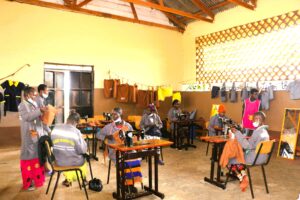
A section of beneficiaries of the Ujuzi manyattani program are taken through a tailoring course | PHOTO-Courtesy
By Correspondent
About 750 previously idle youths in Merti and surrounding areas have acquired the necessary transformative technical skills through the ujuzi manyattani program as a way of curbing cattle rustling and drug trafficking in the area.
The Northern Rangelands Trust (NRT) initiated Ujuzi Manyattani program where the youth are enrolled in tertiary institutions to acquire skills including tailoring, catering, hairdressing, electricity, and solar repair, phone repair, motorcycle repairs, and other business modules.
However, Merti sub-county Deputy County Commissioner Michael Kioni scoffed at parents enticing their children to drop out of school to join criminals trafficking illegal drugs like bhang, human trafficking, and cattle theft.
He said such young people have short lives as the law must deal with them ruthlessly.
“Most young people enroll in form one in numbers of more than 40 students but those who sit their exams are less than 20 as the rest drop along the way to engage in criminal activities including drug trafficking, human trafficking, cattle rustling, and killing innocent people. They can’t do this for more than three years. To end this, it is not only the responsibility of DCC and the security team but all of us,” Kioni said.
Speaking during the graduation ceremony for the 750 youths, Kioni pleaded with parents to embrace tertiary colleges and allow their children to study and get beneficial skills instead of engaging in crime.
Kioni said he is grateful area elders are now collaborating with security agencies and are fighting hard to curb such theft.
“We have our own children who can attend institutions nearby but instead, they are often without students. Why are we wasting the few teachers there? Let’s learn to heir and make use of the institutions as ours. Many grandaunts nowadays are girls whereas the boys are trafficking drugs and bhang and stealing camels that are later sold in Samburu,” Kioni said.
Peter Nguno, the NRT Ujuzi Manyattani program coordinator said the program enables youths to acquire tertiary skills in the local villages who study at their own leisure.
“Beneficiaries picked from the grassroots enjoy the laxity of carrying out their activities while they are ongoing with learning,” Nguno said.
Nguno said that once completed the graduates are given start-up capital and offered them start-up equipment like sewing machines and cooking devices depending on the skills earned to enable them to begin their own small businesses.




